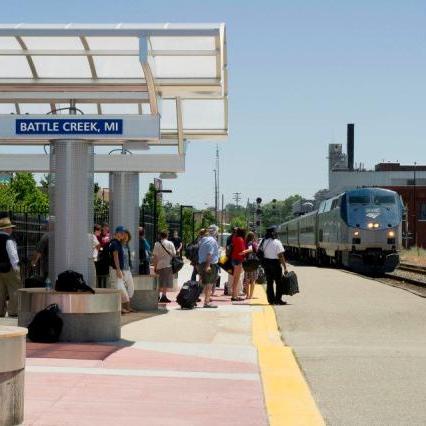Battle Creek, MI (BTL)
The intermodal facility reopened in 2012 following an extensive renovation. New finishes give the depot a fresh, modern appeal, and new canopies and mechanical systems were also installed.

119 McCamly Street South
Battle Creek, MI 49017-3521
Annual Station Ridership (FY 2024): 29,221
- Facility Ownership: City of Battle Creek
- Parking Lot Ownership: City of Battle Creek
- Platform Ownership: Canadian National Railway Company (CN) Grand Trunk Western (GTW) (A subsidiary of CN)
- Track Ownership: Canadian National Railway Company (CN) Grand Trunk Western (GTW) (A subsidiary of CN)
Ismael Cuevas
Regional Contact
governmentaffairschi@amtrak.com
For information about Amtrak fares and schedules, please visit Amtrak.com or call 1-800-USA-RAIL (1-800-872-7245).
In early 2010, the federal government awarded Michigan more than $40 million in stimulus funds to support the development of a high-speed rail corridor between Detroit and Chicago. A portion of these funds was put aside for station improvements, including $3.6 million to rehabilitate the Battle Creek Intermodal Facility. The building closed in late summer 2011 and station operations were relocated to a nearby temporary structure.
Following plans prepared by the local design firm Architects Incorporated, the structure was completely modernized; a ribbon cutting ceremony was held on June 12, 2012. Existing interior spaces were redesigned with contemporary finishes that create a warm and welcoming atmosphere. Office space used by Amtrak employees has a more functional layout, and improvements were also made to the mechanical, electrical and plumbing systems, which had reached the end of their service lives. Areas such as the ticket counters and restrooms were made ADA compliant. The exterior was also updated by replacing the original brick and glass block. Canopies along the platforms were replaced and expanded, and new fencing and light standards have been installed for improved security.
The Battle Creek Intermodal Facility opened in 1982 as a replacement for two stations originally operated by the Grand Trunk Railroad and the Michigan Central Railway. Those depots are now listed on the National Register of Historic Places; the former houses the offices of a community action agency, while the latter is home to a popular local restaurant.
In 1981, a railroad consolidation project was undertaken to eliminate a long-term problem with train and automobile congestion in downtown Battle Creek. The Michigan Central line was shuttered and the tracks removed; therefore, all railroad traffic shifted to the Grand Trunk line on the south side of downtown. This change required a new Amtrak station to be constructed along the southern tracks. The city then bought the Greyhound/Indian Trails terminal with the intention of consolidating rail and intercity bus services at the new $2.1 million intermodal facility. The Federal Transportation Administration contributed approximately $1.7 million towards the project, which the state matched with $425,000. The city donated the required land.
Upon completion in 1982, the intermodal station helped spark the redevelopment of downtown Battle Creek. A hotel, convention arena, water park and up-scale restaurant were constructed, as were headquarters for the Kellogg Company and the Kellogg Foundation.
The city of Battle Creek lies at the confluence of the Kalamazoo River and Battle Creek—the latter named for a confrontation between a government surveyor and Native Americans in 1823. Land speculator Sands McCamly arrived there in 1831 and encouraged other families, including many Quakers from New York State. By the 1840s the village, then known as Milton, was thriving upon milling wood, grain, and flour for area farmers. When incorporated as a town in 1859, the name was changed to Battle Creek.
Local industries found national markets when the railroads arrived, and by the end of the 19th century the city was home to companies such as the Nichols & Shepard and Advance threshing machine companies, Union Steam Pump and American Marsh Pump and V.C. Squier (supplier of strings to violinists world-wide).
In 1855, Seventh-Day Adventists Ellen White and James Elder White came to Battle Creek. Ellen White’s ideas about diet and health proved revolutionary and were the basis for the successful practice of Dr. John Harvey Kellogg, the director of the world-renowned Battle Creek Sanitarium. For 65 years, this institution provided innovative health care. While director, Dr. Kellogg invented breakfast cereal as part of a lighter, vegetarian dietary program for his patients. In 1891, C.W. Post arrived at the sanitarium as a patient and became fascinated by the possibilities of new health foods. He later marketed his own grain-based coffee substitute, Postum, as well as a cereal that he called Grape-Nuts.
Dr. Kellogg’s younger brother, W.K. Kellogg, eventually took over his brother’s pioneering work and in 1906 founded the Battle Creek Toasted Corn Flake Company. He not only built a business empire based on breakfast cereal, but also established a brand name still recognized today as a sign of quality. Primarily though his work, Battle Creek soon gained the moniker “Cereal City.”
Battle Creek’s nearby Army training installation, Fort Custer, opened in 1917, sent many soldiers to both world wars. Returning G.I.s were sent to Battle Creek’s Percy Jones Army Hospital for rehabilitation—the largest Army medical installation by the end of World War II. The hospital made a lasting impact upon the city: Battle Creek became the first city to install wheelchair ramps in its sidewalks to accommodate the Percy Jones patients when they went downtown.
The Blue Water and Wolverine Service are financed primarily through funds made available by the Michigan State Department of Transportation.
Photo courtesy of MDOT.
Station Building (with waiting room)
Features
- ATM not available
- No elevator
- No payphones
- Quik-Trak kiosks
- Restrooms
- Ticket sales office
- Unaccompanied child travel allowed
- Vending machines
- No WiFi
- Arrive at least 45 minutes prior to departure if you're checking baggage or need ticketing/passenger assistance
- Arrive at least 30 minutes prior to departure if you're not checking baggage or don't need assistance
Baggage
- Amtrak Express shipping not available
- No checked baggage service
- No checked baggage storage
- Bike boxes not available
- No baggage carts
- Ski bags not available
- Bag storage
- Shipping Boxes for sale
- Baggage assistance provided by Station Staff
Parking
- Same-day parking is available for a fee
- Overnight parking is available; fees may apply
Accessibility
- No payphones
- Accessible platform
- Accessible restrooms
- Accessible ticket office
- Accessible waiting room
- Accessible water fountain
- Same-day, accessible parking is available; fees may apply
- Overnight, accessible parking is available; fees may apply
- No high platform
- Wheelchair available
- Wheelchair lift available
Hours
Station Waiting Room Hours
| Mon | 08:00 am - 10:00 pm |
| Tue | 08:00 am - 10:00 pm |
| Wed | 08:00 am - 10:00 pm |
| Thu | 08:00 am - 10:00 pm |
| Fri | 08:00 am - 10:00 pm |
| Sat | 08:00 am - 10:00 pm |
| Sun | 08:00 am - 10:00 pm |
Ticket Office Hours
| Mon | 08:00 am - 03:30 pm |
| Tue | 08:00 am - 03:30 pm |
| Wed | 08:00 am - 03:30 pm |
| Thu | 08:00 am - 03:30 pm |
| Fri | 08:00 am - 03:30 pm |
| Sat | CLOSED |
| Sun | CLOSED |
Passenger Assistance Hours
| Mon | 08:00 am - 03:30 pm |
| Tue | 08:00 am - 03:30 pm |
| Wed | 08:00 am - 03:30 pm |
| Thu | 08:00 am - 03:30 pm |
| Fri | 08:00 am - 03:30 pm |
| Sat | CLOSED |
| Sun | CLOSED |
Checked Baggage Service
Parking Hours
Quik-Track Kiosk Hours
| Mon | 08:00 am - 10:00 pm |
| Tue | 08:00 am - 10:00 pm |
| Wed | 08:00 am - 10:00 pm |
| Thu | 08:00 am - 10:00 pm |
| Fri | 08:00 am - 10:00 pm |
| Sat | 08:00 am - 10:00 pm |
| Sun | 08:00 am - 10:00 pm |


 Amtrak established the Great American Stations Project in 2006 to educate communities on the benefits of redeveloping train stations, offer tools to community leaders to preserve their stations, and provide the appropriate Amtrak resources.
Amtrak established the Great American Stations Project in 2006 to educate communities on the benefits of redeveloping train stations, offer tools to community leaders to preserve their stations, and provide the appropriate Amtrak resources. Amtrak is seizing a once-in-a-lifetime opportunity to transform rail and Retrain Travel. By modernizing, enhancing and expanding trains, stations and infrastructure, Amtrak is meeting the rising demand for train travel. Amtrak offers unforgettable experiences to more than 500 destinations across 46 states and parts of Canada. Learn more at
Amtrak is seizing a once-in-a-lifetime opportunity to transform rail and Retrain Travel. By modernizing, enhancing and expanding trains, stations and infrastructure, Amtrak is meeting the rising demand for train travel. Amtrak offers unforgettable experiences to more than 500 destinations across 46 states and parts of Canada. Learn more at